人教版中考英语知识点大全
人教版初三英语知识点总结

人教版初三英语知识点总结一、语法重点1. 时态- 一般现在时:表示经常发生的动作或状态。
- 一般过去时:表示过去发生的动作或状态。
- 现在进行时:表示正在进行的动作。
- 过去进行时:表示过去某一时刻正在进行的动作。
- 一般将来时:表示将来会发生的动作。
- 现在完成时:表示过去发生的动作对现在的影响或结果。
- 过去完成时:表示在过去某一动作之前已经完成的另一动作。
2. 语态- 被动语态:表示主语是动作的承受者。
- 一般现在时被动语态:am/is/are + past participle。
- 一般过去时被动语态:was/were + past participle。
- 现在进行时被动语态:am/is/are being + past participle。
- 一般将来时被动语态:will be + past participle。
3. 非谓语动词- 动名词:作为名词使用,表示动作。
- 分词:现在分词(表示正在进行)和过去分词(表示被动或完成)。
- 不定式:to + base form of verb,表示动作的目的、意图或结果。
4. 情态动词- can/could:表示能力或请求。
- may/might:表示可能性。
- must:表示必须或强烈义务。
- should/ought to:表示建议或应当。
5. 句子结构- 简单句:一个主语和一个谓语。
- 并列句:使用并列连词连接两个或多个简单句。
- 复合句:包含一个主句和至少一个从句。
- 定语从句:修饰名词或代词的从句。
- 状语从句:表示时间、地点、原因、条件、结果等。
二、词汇与短语1. 常见词汇- 描述人物特征的形容词:kind, honest, creative, etc.- 描述日常活动的动词短语:clean up, take out, turn off, etc.- 描述情感和情绪的名词:happiness, sadness, anger, etc. - 描述天气的词汇:sunny, rainy, windy, etc.2. 短语搭配- 动词短语搭配:finish doing, stop to do, remember to do, etc.- 形容词与介词的搭配:afraid of, interested in, good at, etc.- 常用口语表达:What's up?, How about…?, It's up to you, etc.三、阅读理解技巧1. 快速阅读(Skimming)- 快速浏览文章,抓住主旨大意。
新人教版 中考英语知识点整理
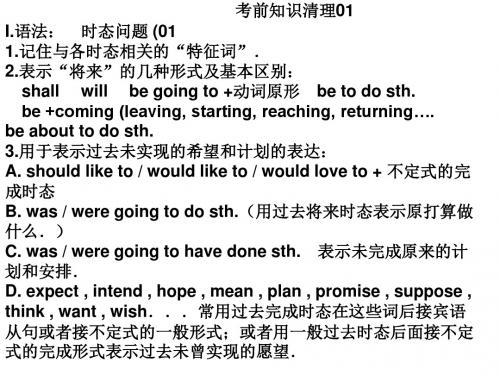
III. 词汇 A. 常用动词用法 (02) look link-v look + adj. (过去分词,名词,介词短语,)看起来, look about 四周打量 look about for 四处寻找 look ahead 预测未来 look like 看起来像 look as if 看起来好像 look well 看起来不错
II. 句型复习: What’s wrong (the matter, the trouble) with …? Is there anything wrong (the matter ) with …? There is something (nothing ) wrong (the matter) with…? Something (Nothing ) is wrong (the matter) with…? in order that…may (might, can, could,…) … so that…can (could, may, might…) …; so as to (in order to) do sth. do (try) one’s best to do sth. do what (everything, all) you can do sth. what he said… all that he said…
新人教版中考英语必背单词、短语、句型
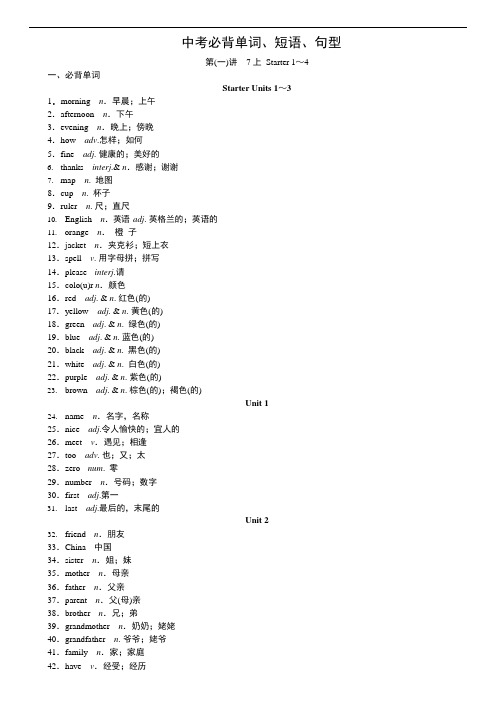
一、必背单词1.morning n.早晨;上午2.afternoon n.下午3.evening n.晚上;傍晚4.how adv.怎样;如何5.fine adj. 健康的;美好的6.thanks interj.& n.感谢;谢谢7.map n. 地图8.cup n. 杯子9.ruler n. 尺;直尺中考必背单词、短语、句型第(一)讲7 上Starter 1~4Starter Units 1~310.English n.英语adj. 英格兰的;英语的11.orange n.橙子12.jacket n.夹克衫;短上衣13.spell v. 用字母拼;拼写14.please interj.请15.colo(u)r n.颜色16.red adj. & n. 红色(的)17.yellow adj. & n. 黄色(的)18.green adj. & n. 绿色(的)19.blue adj. & n. 蓝色(的)20.black adj. & n. 黑色(的)21.white adj. & n. 白色(的)22.purple adj. & n. 紫色(的)23.brown adj. & n. 棕色(的);褐色(的) n.名字,名称25.nice adj.令人愉快的;宜人的26.meet v.遇见;相逢27.too adv. 也;又;太28.zero num. 零29.number n.号码;数字30.first adj.第一st adj.最后的,末尾的32.friend n.朋友33.China 中国34.sister n.姐;妹35.mother n.母亲36.father n.父亲37.parent n.父(母)亲38.brother n.兄;弟39.grandmother n.奶奶;姥姥40.grandfather n. 爷爷;姥爷41.family n.家;家庭42.have v.经受;经历Unit 1 Unit 243.cousin n.堂兄(弟、姊、妹);表兄(弟、姊、妹)44.aunt n.姑母;姨母;伯母;婶母;舅母45.uncle n.舅父;叔父;伯父;姑父;姨父46.daughter n.女儿47.photo n.照片48.next adj. & n. 下一个(的);接下来(的) 49.picture n. 照片;图画50.eraser n.橡皮51.dictionary n.词典;字典52.excuse v.原谅;宽恕53.thank v.感谢;谢谢54.teacher n.老师;教师55.help v. & n.帮助;援助56.welcome adj.受欢迎的57.baseball n.棒球58.watch n.表;手表59.computer n.计算机;电脑60.card n.卡片61.notebook n.笔记本62.ring n.戒指63.library n.图书馆64.ask v.请求;要求;询问65.find v.找到;发现66.some adj.一些;某些pron.有些;有的67.email n.电子邮件68.call v.打电话69.lost v.遗失;丢失70.must modal v.必须71.table n.桌子72.bed n.床73.chair n.椅子74.under prep.在……下75.desk n.书桌76.hat n.帽子77.know v.知道;了解78.radio n.收音机;无线电广播79.clock n.时钟80.everywhere adv.处处;到处;各个地方81.always adv.总是二、重点短语1.good morning 早上好2.good afternoon 下午好3.good evening 晚上好4.name list 名单5.in English 用英语6.what color 什么颜色7.telephone /phone number 电话号码Unit 3 Unit 48.first name 名字9.last name 姓10.middle school 中学11.have a good day 过得愉快12.two photos of my family 两张我家的全家福13.in the first photo 在第一张照片里14.the name of ……的名字15.pencil box 铅笔盒;文具盒16.excuse me 劳驾,请原谅17.ID card 学生卡18.Lost and Found 失物招领处19.email sb. at ... 发邮件给某人至……20.call sb. at ... 拨打电话……找某人21.a set of keys 一串钥匙22.ask ...for ... 请求;恳求(给予)23.on the sofa 在沙发上24.come on 快点儿25.tape player 录音机26.model plane 飞机模型27.on the teacher's desk 在讲桌上28.the key to ............... 的钥匙;……的答案三、必背句型1.What's this in English?这个用英语怎么说?2.What color is it?它是什么颜色的?3.Nice/Glad to meet you.见到你很高兴。
英语人教版九年级全册中考专项复习

年中考英语专习专题一Grammar Revision 名词(Nouns)考点解读:中考对于名词的考查主要侧重以下几点:1.可数名词的复数。
2. 不可数名词的量。
3.名词所有格的用法。
4. 名词的句法作用。
5.词义辨析。
6. 名词与主谓一致。
考查形式主要有:完形填空、完成句子、短文填空等题型。
复习目标:1、知道名词的分类2、掌握可数名词的复数(规则变化和不规则变化)3、掌握不可数名词数量的表达法4、了解名词所有格的用法(双重所有格和名词复数所有格)5、注意名词作主语和定语的用法教学过程:一、名词的分类名词是表示人、事物、地点或抽象概念的名称的词专有名词:表示人、地方、事物、机构、组织等名称的词。
第一个字母一般要大写。
如:Lucy 、Beijing、China、the Great Wall、等。
普通名词:表示一类人或事物、某种物质或抽象概念的名称。
如:book 、tree 等。
普通名词⎩⎪⎨⎪⎧ 可数名词⎩⎨⎧ 个体名词:chair ,book 集体名词:people ,family 不可数名词⎩⎨⎧ 物质名词:rain ,ice ,sunshine 抽象名词:love ,knowledge二、可数名词的复数形式可数名词有单数、复数两种形式。
名词复数构成形式分规则变化和不规则变化:1.名词复数的规则变化(1)一般情况加 -s 1.清辅音后读/s/map-maps book-books2.浊辅音和元音后读 /z/ bag-bags car-cars(2)以s, x,sh, ch 等结尾的词加 -es 读 /iz/bus-buses watch-watches但如果以 –ch 结尾的名词发音为 [k]时,只加 –s 。
stomach — stomachs 读 /s/(3)以辅音字母+y 结尾的词变y 为i 再加es. ies 读 /iz/party-parties baby---babies以元音字母+y 结尾的名词变复数时,直接加-s 变复数:读 /z/monkey---monkeys holiday---holidays(4)以f 或 fe 结尾的名词变复数时,去f 、 fe 加-ves 读 /vz/leaf---leaves wolf---wolveslife---lives thief---thieves但也有例外,如 roof---roofs chief---chiefs以o 结尾的名词,多数加 s 读 /z/。
人教版中考英语知识点
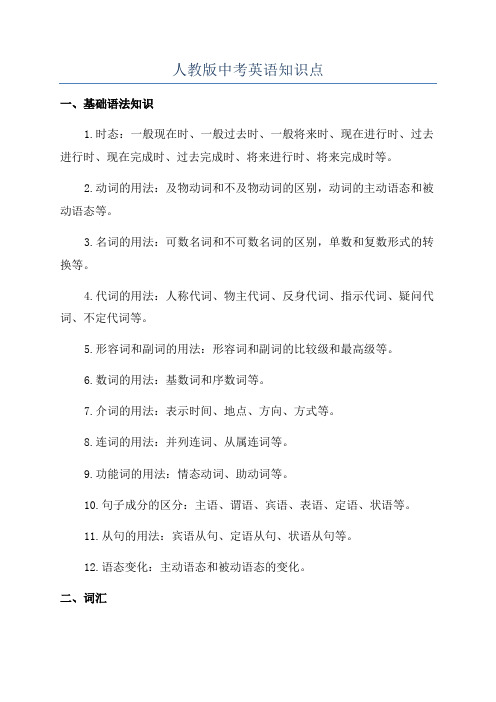
人教版中考英语知识点一、基础语法知识1.时态:一般现在时、一般过去时、一般将来时、现在进行时、过去进行时、现在完成时、过去完成时、将来进行时、将来完成时等。
2.动词的用法:及物动词和不及物动词的区别,动词的主动语态和被动语态等。
3.名词的用法:可数名词和不可数名词的区别,单数和复数形式的转换等。
4.代词的用法:人称代词、物主代词、反身代词、指示代词、疑问代词、不定代词等。
5.形容词和副词的用法:形容词和副词的比较级和最高级等。
6.数词的用法:基数词和序数词等。
7.介词的用法:表示时间、地点、方向、方式等。
8.连词的用法:并列连词、从属连词等。
9.功能词的用法:情态动词、助动词等。
10.句子成分的区分:主语、谓语、宾语、表语、定语、状语等。
11.从句的用法:宾语从句、定语从句、状语从句等。
12.语态变化:主动语态和被动语态的变化。
二、词汇1.常用词汇的记忆:时态、语态、动词、名词、代词、形容词、副词、介词、连词、感叹词、频度副词、情态动词、冠词、人称代词、物主代词等。
2.词义辨析:同义词和近义词的辨析。
3.词根、词缀的了解和运用。
4.拓展词汇:同义词、反义词、接近词、派生词等。
三、听力技巧1.正确使用听力材料前的时间,通过查阅听力材料的背景信息,对题目进行适当的预测。
2.注意听力材料的主要内容,抓住关键词,同时注意关注细节。
3.学会辨别转折词、数词、位置、时间等关键信息。
4.通过听力材料获得答案时,要注意时态的转换。
四、阅读技巧1.对题目进行预测,通过阅读标题、段落的开头和结尾等来猜测文章的主旨。
2.快速阅读文章,抓住关键词和短语。
3.根据题目要求找出关键信息,定位答案。
4.了解文章的基本结构,掌握一些常见的表达方式和句式结构。
5.注意阅读文章中的标点符号和连接词,理解长难句的意思。
五、写作技巧1.选择题材,在写作前进行头脑风暴,确定写作的主题和中心思想。
2.合理组织写作框架,包括开头、主体和结尾,注意段落之间的过渡。
人教版九年级英语知识点总结
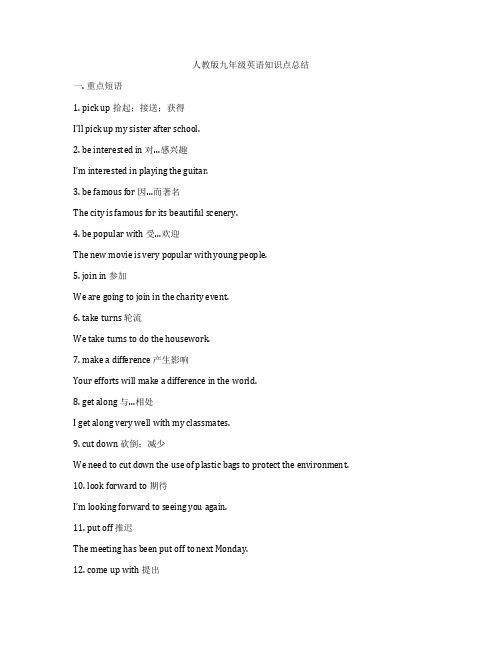
人教版九年级英语知识点总结一. 重点短语1. pick up 拾起;接送;获得I’ll pick up my sister after school.2. be interested in 对…感兴趣I’m interested in playing the guitar.3. be famous for 因…而著名The city is famous for its beautiful scenery.4. be popular with 受…欢迎The new movie is very popular with young people.5. join in 参加We are going to join in the charity event.6. take turns 轮流We take turns to do the housework.7. make a difference 产生影响Your efforts will make a difference in the world.8. get along 与…相处I get along very well with my classmates.9. cut down 砍倒;减少We need to cut down the use of plastic bags to protect the environment.10. look forward to 期待I’m looking forward to seeing you again.11. put off 推迟The meeting has been put off to next Monday.12. come up with 提出We need to come up with a plan for the project. 13. keep in touch 保持联系We keep in touch by sending emails.14. make up 编造;弥补She made up a story about why she was late.15. run out of 用完We have run out of milk and need to buy some more.二. 重点语法1. 一般现在时肯定句:主语 + V原 + 其他He plays football every weekend.否定句:主语 + do not/does not + V原 + 其他I do not like watching horror movies.疑问句:Do/Does + 主语 + V原 + 其他Do they enjoy playing basketball?2. 一般过去时肯定句:主语 + V-ed/Vt + 其他She visited Beijing last year.否定句:主语 + did not + V原 + 其他We did not go to the concert last night.疑问句:Did + 主语 + V原 + 其他Did you finish your homework yesterday?3. 现在进行时肯定句:主语 + am/is/are + V-ing + 其他She is watching TV now.否定句:主语 + am/is/are + not + V-ing + 其他He is not playing football at the moment.疑问句:Am/Is/Are + 主语 + V-ing + 其他Are you studying for the exam?4. 一般将来时肯定句:主语 + will + V原 + 其他She will travel to Japan next month.否定句:主语 + will not + V原 + 其他I will not forget to call you.疑问句:Will + 主语 + V原 + 其他Will he come to the party?5. 现在完成时肯定句:主语 + have/has + V过去分词 + 其他They have finished their homework.否定句:主语 + have/has + not + V过去分词 + 其他We have not seen this movie yet.疑问句:Have/Has + 主语 + V过去分词 + 其他Have you ever been to Paris?6. 被动语态肯定句:主语 + am/is/are + V过去分词 + 其他The book is written by my favorite author.否定句:主语 + am/is/are + not + V过去分词 + 其他The dishes are not washed by my brother.疑问句:Am/Is/Are + 主语 + V过去分词 + 其他Is the car fixed by the mechanic?三. 重点词汇1. 人物teacher 老师student 学生doctor 医生nurse 护士engineer 工程师pilot 飞行员musician 音乐家actor 演员writer 作家scientist 科学家athlete 运动员2. 动作run 跑步jump 跳跃swim 游泳dance 跳舞sing 唱歌play 演奏climb 爬山cook 烹饪paint 绘画ride 骑行3. 环境house 房子school 学校hospital 医院office 办公室library 图书馆park 公园beach 海滩mountain 山river 河lake 湖四. 重点句型1. 八大情态动词can 能够I can speak English fluently.could 过去能够She could play the piano when she was five. may 可能May I go to the restroom, please?might 可能It might rain this afternoon.must 必须You must finish your homework before 8pm. shall 将要Shall we go to the movies tonight?should 应该You should study for the exam tomorrow.will 将要We will visit the Great Wall next week.2. 祈使句Be quiet! 安静!Don’t be late! 别迟到!Sit down, please. 请坐下。
人教版初三英语知识点
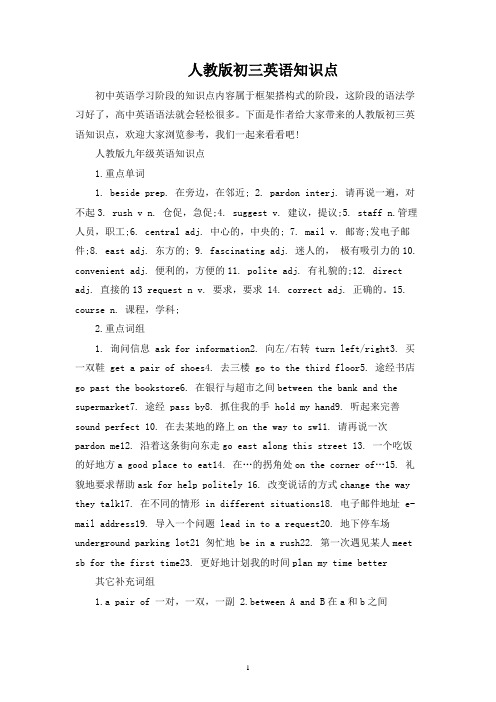
人教版初三英语知识点初中英语学习阶段的知识点内容属于框架搭构式的阶段,这阶段的语法学习好了,高中英语语法就会轻松很多。
下面是作者给大家带来的人教版初三英语知识点,欢迎大家浏览参考,我们一起来看看吧!人教版九年级英语知识点1.重点单词1. beside prep. 在旁边,在邻近;2. pardon interj. 请再说一遍,对不起3. rush v n. 仓促,急促;4. suggest v. 建议,提议;5. staff n.管理人员,职工;6. central adj. 中心的,中央的;7. mail v. 邮寄;发电子邮件;8. east adj. 东方的;9. fascinating adj. 迷人的,极有吸引力的10. convenient adj. 便利的,方便的11. polite adj. 有礼貌的;12. direct adj. 直接的13 request n v. 要求,要求 14. correct adj. 正确的。
15. course n. 课程,学科;2.重点词组1. 询问信息 ask for information2. 向左/右转 turn left/right3. 买一双鞋 get a pair of shoes4. 去三楼 go to the third floor5. 途经书店go past the bookstore6. 在银行与超市之间between the bank and the supermarket7. 途经 pass by8. 抓住我的手 hold my hand9. 听起来完善sound perfect 10. 在去某地的路上on the way to sw11. 请再说一次pardon me12. 沿着这条街向东走go east along this street 13. 一个吃饭的好地方a good place to eat14. 在…的拐角处on the corner of…15. 礼貌地要求帮助ask for help politely 16. 改变说话的方式change the way they talk17. 在不同的情形 in different situations18. 电子邮件地址 e-mail address19. 导入一个问题 lead in to a request20. 地下停车场underground parking lot21 匆忙地 be in a rush22. 第一次遇见某人meet sb for the first time23. 更好地计划我的时间plan my time better 其它补充词组1.a pair of 一对,一双,一副2.between A and B在a和b之间3.on one’s / the way to 在去……的路上4.pardon me 什么,请再说一遍5.pass by 途经经过6.look forward to 盼望期待7.excuse me 打扰了请谅解 8.get some magazines 得到一些杂志9.get some information about 获取有关……的一些信息10.turnleft\right 向左\向右转11.go past 经过途经 12.a little earlier 早一点儿13.a good place to eat 一个吃饭的好地方 14.in different situation 在不同的情形下15.on time 准时按时 16.get to 到达17.have dinner 吃晚餐18.on one’s / \the right在右边19Xe on 快点请过来 20.the shopping center 购物中心21.the corner of....... 的角落/拐角处 22.lead into 导入引入3.重点句式1. ---请问,你能告知我怎样才能到书店吗?---当然,只需沿主街走只到你途经中心街。
(完整word版)中考人教版英语复习资料
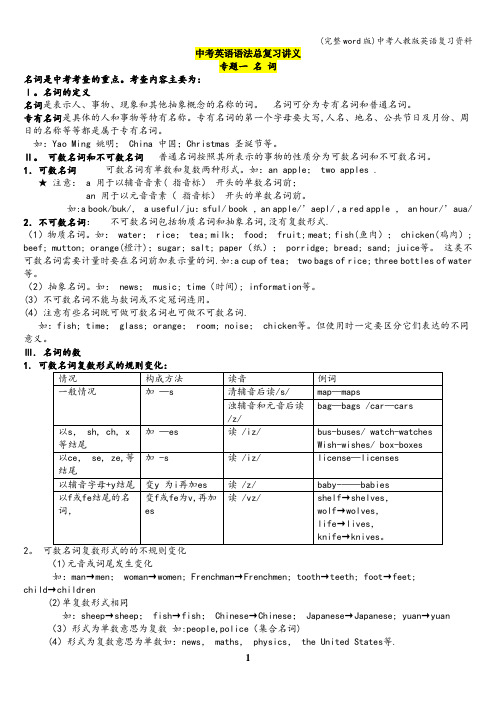
中考英语语法总复习讲义专题一名词名词是中考考查的重点。
考查内容主要为:Ⅰ。
名词的定义名词是表示人、事物、现象和其他抽象概念的名称的词。
名词可分为专有名词和普通名词。
专有名词是具体的人和事物等特有名称。
专有名词的第一个字母要大写,人名、地名、公共节日及月份、周日的名称等等都是属于专有名词。
如:Yao Ming 姚明; China 中国;Christmas 圣诞节等。
Ⅱ。
可数名词和不可数名词普通名词按照其所表示的事物的性质分为可数名词和不可数名词。
1.可数名词可数名词有单数和复数两种形式。
如:an apple; two apples .★ 注意: a 用于以辅音音素( 指音标)开头的单数名词前;an 用于以元音音素(指音标)开头的单数名词前。
如:a book/buk/, a useful/ju:sful/ book ,an apple/’aepl/ ,a red apple ,an hour/’aua/ 2.不可数名词:不可数名词包括物质名词和抽象名词,没有复数形式.(1)物质名词。
如: water; rice; tea; milk; food; fruit; meat; fish(鱼肉); chicken(鸡肉); beef; mutton; orange(橙汁);sugar; salt; paper(纸); porridge; bread; sand; juice等。
这类不可数名词需要计量时要在名词前加表示量的词.如:a cup of tea; two bags of rice; three bottles of water 等。
(2)抽象名词。
如: news; music; time(时间); information等。
(3)不可数名词不能与数词或不定冠词连用。
(4)注意有些名词既可做可数名词也可做不可数名词.如:fish; time; glass; orange; room; noise; chicken等。
(人教版)中考英语总复习语法:专题8-动词的时态、语态(101页)

(2)过去完成时与现在完成时的主要区别是时间参 照点不同: 过去完成时的时间参照点是某个“过去的” 时间;现在完成时的时间参照点是“现在”。因此现在 完成时中的很多规则,也适用于过去完成时。 When I got to the cinema, the film had been on. 当我到达电影院时,电影已经开始了。
以辅音字母+y结尾的动词, 把y变为i再加-ed
以一个元音字母加一个辅音 字母结尾的重读闭音节词, 双写结尾字母再加-ed
study→studied carry→carried stop→stopped drop→dropped prefer→preferred
3.一般将来时 (1)表示将来某个时间要发生的动作或存在的状 态,其构成形式:“will/shall+动词原形”。常与表 示将来的时间状语tomorrow,next week,in+一段时 间等连用。 当主语是第一人称I或we时,问句中一般用shall。
③表单纯性的将来,与人的主观愿望和判断无关 时。 If it's made of wood, it will float on water. 这要是木材做的,它能浮在水面上。 (4)当主句为一般将来时态时,在if,as soon as, until, when等引导的状语从句中用一般现在时代替一 般将来时。 I will call you as soon as I get there. 我一到那儿就给你打电话。
特殊情况:have→has,am/are→is 考查热点:如果主句为一般将来时,if,unless等 引导的条件状语从句和when,until,as soon as等引导 的时间状语从句常用一般现在时表示将来。 What about going climbing if it doesn't rain tomorrow? 如果明天不下雨,去爬山怎么样?
人教版中考英语一轮复习:九年级英语Unit1-Unit 14 各单元重点语法知识点复习提纲(全面!)

人教版九年级全一册英语Unit 1 -Unit 14 各单元重点语法知识点复习提纲Unit 1 How can we become good learners?一、【精选单词】:ability n.能力;才能, attention注意;关注, brain大脑,conversation n. 交谈;谈话, expression n.表达(方式);表示, grammar n.语法,knowledge n.知识;学问, note n.笔记;记录, pronunciation n.发音;读音,secret n. 秘密;秘诀adj. 秘密的;保密的, speed n. 速度, textbook n. 教科书;课本,connect v.(使)连接;与⋯⋯有联系, create创造, discover v. 发现;发觉, increase v. 增加;增长,pronounce v.发音, repeat v.重复;重做, review v. & n. 回顾;复习,active adj. 活跃的;积极的, patient adj.有耐心的n.病人,二、【词组短语】1.become good learners .成为好的学习者2.work with friends .和朋友一块工作3.make word cards .做单词卡4.read the textbook .读课本5.listen to tapes .听磁带6.ask the teacher for help6.找老师帮忙7.study for a test .备考8.work with a groups.小组学习9.watch videos .看录像10.have conversations with sb.10.和某人交谈11.read aloud 大声读12.practce pronunciation12.练习发音13.learn a lot .学到许多14.improve my reading skills .提高我的阅读技能15.too hard to understand 太难理解16.spoken English英语口语17.a little nervous有点紧张18.finish reading读完19.give a report作报告20.get the main ideas理解大意21.word by word 逐词22.read word groups读词组23.guess a word's meaning猜词意24.be patient with sb.对...有耐心25.the more you read, the faster you'll be.你读的越多,你读的就越快26.find it difficult to learn 发现学习难27.the secret to language learning 语言学习的秘诀28.learn to do sth 学会做某事29.so……that如此……以至于30.most of the time 大部分时间31.be afraid to do 害怕32.because of my poor pronunciation因为我发音不好33.hide behind my textbook藏在我的课本后34.fall in love with 爱上35.begin to do 开始做36.body language.肢体语言37.expressions on their faces.面部表情38.listen for just the key words只留心听关键词39.as well as和...一样好/也40.something interesting一些有趣的东西eful sentences有用的句子42.a piece of cake小菜一碟/很容易的事情43.it serves you right.活该44.look them up查询他们45.so that以便46.have a better understanding of对...有一个更好的理解47.repeat out loud大声重复出来48.take notes记笔记49.do grammar exercises做语法练习50.keep a diary in English用英语记日记51.increase my reading speed提高我的阅读速度52.make mistakes in grammar/spelling在语法/拼写方面犯错53.get the pronunciation right把发音弄准确54.get much writing practice进行许多书写练习55.have a partner to practice English with找个一块练英语的伙伴56.a successful learner 一个成功的学习者57.be born with 与生俱来/天生具有58.the ability to learn 学习能力59.whether or not 不管还是60.depend on依靠61.learning habits学习习惯62.have ... in common 在...有共性63.creat an interest in sth.在.....创造兴趣64.be interested in感兴趣65.pay attention to关心,注意66.connect ...with把... 和...相连接67.get bored厌烦68.learn from mistakes从错误中学习.69.think about 考虑70.be good at擅长71.even if即使72.practice makes perfect熟能生巧73.keep practicing坚持练习74.develop their study skills培养他们的学习技巧75.it is not enough to do sth干……还不够76.write down写下77.draw mind maps画思维导图78.look for ways to do寻找做……的办法79.explain sth to sb.向某人解释……80.ask each other相互问81.find out the answers找到答案82.knowledge comes from questioning.知识来源于质疑83.a lifelong journey.一生的旅行84.learn wisely.智慧地学习?85.three good ways to .三个做……好办法86.be stressed out紧张的87.develop smart study skills.培养聪明的学习技巧88.on one's own.某人亲自89.bit by bit.一点一点的/逐渐地90.the last minute to do.做……的最后时刻91.at once.立刻,马上92.prepare well for sth准备好93.worry about.担心94.over and over again一次就一次地95.have a listening test.进行一次听力考试三、【重点句型】1. What about listening to tapes?听磁带怎么样?2. How do you study for a test?你怎样为考试而学习的?3. I study by making word cards.我通过制作单词卡片来学习。
人教版初中英语中考80个重要考点
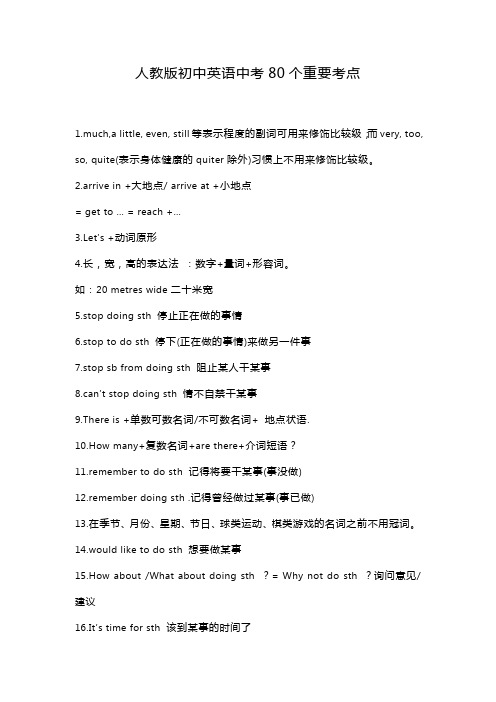
人教版初中英语中考80个重要考点1.much,a little, even, still等表示程度的副词可用来修饰比较级;而very, too, so, quite(表示身体健康的quiter除外)习惯上不用来修饰比较级。
2.arrive in +大地点/ arrive at +小地点= get to … = reach +…3.Let’s +动词原形4.长,宽,高的表达法:数字+量词+形容词。
如:20 metres wide二十米宽5.stop doing sth 停止正在做的事情6.stop to do sth 停下(正在做的事情)来做另一件事7.stop sb from doing sth 阻止某人干某事8.can’t stop doing sth 情不自禁干某事9.There is +单数可数名词/不可数名词+ 地点状语.10.How many+复数名词+are there+介词短语?11.remember to do sth 记得将要干某事(事没做)12.remember doing sth .记得曾经做过某事(事已做)13.在季节、月份、星期、节日、球类运动、棋类游戏的名词之前不用冠词。
14.would like to do sth 想要做某事15.How about /What about doing sth ?= Why not do sth ?询问意见/建议16.It’s time for sth 该到某事的时间了17.It’s time to do sth该到干某事的时间了18.have fun doing sth 很高兴干某事19.make sb do sth 使某人干某事20.can’t afford to do sth 没有足够多钱干某事21.can’t stand doing sth 不能忍受干某事22.mind doing sth 介意干某事23.try to do sth 尽力干某事24.finish doing sth 结束干某事25.decide to do sth 决定干某事26.plan to do sth 计划干某事27.It +takes +sb.+时间+to do sth28.sb. +spend +时间+on sth (in doing sth )29.Can you do sth ?你可以做,,,吗30.be busy doing sth 忙于干某事31.called = named = with the name (of)32.at the age of = when sb was/ were ….33.because of 后面接名词、代词、名词性短语、what从句34.keep doing sth . 表示不间断地持续做某事或一直做某事。
人教版九年级英语词组总结

人教版九年级英语词组总结Unit 1 How can we become good learners?一、重点词组。
1. ask sb. for help向某人寻求帮助。
2. read aloud大声朗读。
3. be afraid to do sth.害怕做某事。
4. fall in love with爱上(强调动作)5. as well也(用于句末)6. look up查阅(字典、资料等)7. take notes做笔记。
8. make mistakes犯错误。
9. connect... with...把……和……连接/联系起来。
10. get bored变得厌烦。
11. be interested in对……感兴趣。
12. pay attention to注意。
13. depend on取决于;依靠。
14. the secret to...……的秘诀。
15. in common共同的;共有的。
Unit 2 I think that mooncakes are delicious!一、重点词组。
1. put on增加(体重);发胖。
2. be similar to与……相似。
3. throw... at...向……扔……4. wash away冲走;冲掉。
5. in the shape of呈……的形状。
6. call out大声呼喊。
7. lay out摆开;布置。
8. end up最终成为;最后处于。
9. share sth. with sb.与某人分享某物。
10. care about关心;在乎。
11. make money挣钱。
12. used to do sth.过去常常做某事。
13. remind sb. of sth.使某人想起某事。
Unit 3 Could you please tell me where the restrooms are?一、重点词组。
1. turn left/right向左/右转。
人教版初中英语中考复习知识点归纳总结全册
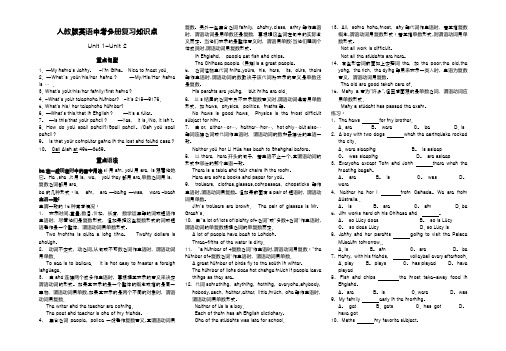
人教版英语中考分册复习知识点Unit 1-Unit 2重点句型1. —My name's Jenny。
-I’m Gina。
Nice to meet you.2. —What’s your/his/her name?—My/His/Her name is … .3. What’s your/his/her family/first name?4. -What’s your telephone number? -It’s 218—9176.5. What’s his/ her telephone number?6. —What’s this/that in English?—It's a ruler。
7。
—Is this/that your pencil?—Yes,it is./No, it isn’t。
8. How do you spell pencil?/Spell pencil。
/Can you spell pencil?9。
Is that your computer game in the lost and found case?10。
Call Alan at 495—3539。
重点语法be在一般现在时中的基本用法:I用am, you用are,is跟着他她它。
He ,she ,it用is,we,you they都用are.单数名词用is,复数名词都用are.be的几种形式:is,am,are —being —was,were -been 主谓一致:主谓一致的15种常考情况:1.表示时间,重量,数目,价格,长度,数学运算等的词或短语作主语时,尽管他们是复数形式,但如果把这些复数形式的词或短语看作是一个整体,谓语动词用单数形式。
Two months is quite a long time。
Twenty dollars is enough。
2.动词不定式,动名词,从句或不可数名词作主语时,谓语动词用单数.To see is to believe. It is not easy to master a foreign language.3.由and连接两个成分作主语时,要根据其表示的意义来决定谓语动词的形式。
人教版九年级英语unit6知识点总结
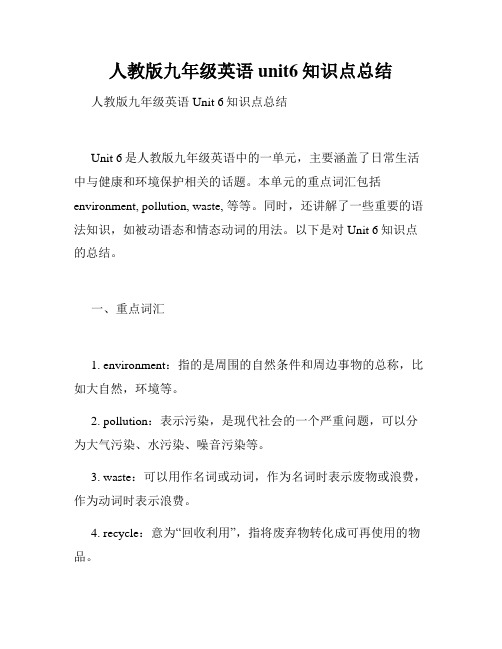
人教版九年级英语unit6知识点总结人教版九年级英语Unit 6知识点总结Unit 6是人教版九年级英语中的一单元,主要涵盖了日常生活中与健康和环境保护相关的话题。
本单元的重点词汇包括environment, pollution, waste, 等等。
同时,还讲解了一些重要的语法知识,如被动语态和情态动词的用法。
以下是对Unit 6知识点的总结。
一、重点词汇1. environment:指的是周围的自然条件和周边事物的总称,比如大自然,环境等。
2. pollution:表示污染,是现代社会的一个严重问题,可以分为大气污染、水污染、噪音污染等。
3. waste:可以用作名词或动词,作为名词时表示废物或浪费,作为动词时表示浪费。
4. recycle:意为“回收利用”,指将废弃物转化成可再使用的物品。
5. protect:表示保护,指采取措施,预防破坏或危害。
6. global:意为“全球的”,用来描述事情或现象具有全球性的范围和影响。
7. vehicle:表示车辆,可用来指代各种交通工具,如汽车、火车等。
二、重要句型和语法知识1. 被动语态(Passive Voice)被动语态是英语中重要的语法结构之一,使用形式为“助动词be + 及物动词的过去分词”。
例如:- The book was written by him.(这本书是他写的。
)被动语态常用于以下情况:- 强调动作的接受者(宾语)而不是执行动作的人(主语)。
- 主语未知或不重要。
- 特定情境下。
2. 情态动词(Modal Verbs)情态动词用来表示情态、可能性、建议、允许等。
常见的情态动词有can, could, may, might, should, must, ought to等。
例如:- You should recycle the plastic bottles.(你应该回收塑料瓶。
)3. 祈使句(Imperatives)祈使句是用来发出命令、请求、建议等的句子。
人教版中考英语复习教材核心词汇知识点精讲精练九年级全册Unit1-Unit2

_n_o_v_e_l _b_u_s_in__es_s_ _w_a_r_n_ _p_r_e_se_n_t_ _sp__re_a_d_
【百变词汇】 1. aloud 大声地; 出声地adv.
→_lo_u_d_ adv. 大声地 adj. 大声的 → _lo_u_d__ly_ adv. 响亮地 2. pronunciation 发音; 读音 n. → _p_r_o_n_o_u_n_c_e_ v. 发音 3. discover 发现; 发觉 v. →_d_i_sc_o_v_e_r_y_ n. 发现 4. expression 表情; 表示; 表达方式n. → _e_x_p_r_e_ss_ v. 表达
_b_it_b__y_b_i_t _in__st_e_a_d_o_f_ _p_u_t _o_n_ _b_e_s_i_m_i_l_a_r_t_o_. _. _. _w_a_s_h__a_w_a_y_ _sh__o_o_t _d_o_w_n_ _fl_y_u_p_ _c_a_ll_o_u_t_
30. 摆开; 布置 31. 捉弄某人 32. 与……分享…… 33. (作为)结果 34. 盛装打扮 35. 关心; 在意 36. 最终成为; 最后处于 37. 唤醒; 叫醒 38. 不但……而且……
→_s_t_ra_n__g_e adj. 陌生的
→ _d_e_a_th_ n. 死; 死亡 → _d_ie_ v. 死; 死亡 →__tr_a_d_i_t_io_n_a_l_adj. 传统的 → _a_d_m_i_r_a_t_io_n_ n. 羡慕 →_p_u_n_i_s_h_m_e_n_t_ n. 惩罚 →_w_a_r_m_ adj. 温暖的
课本原句 The more you read, the faster you’ll be. 你读得越多, 你就会(读得)
人教版初中英语中考英语语法总结
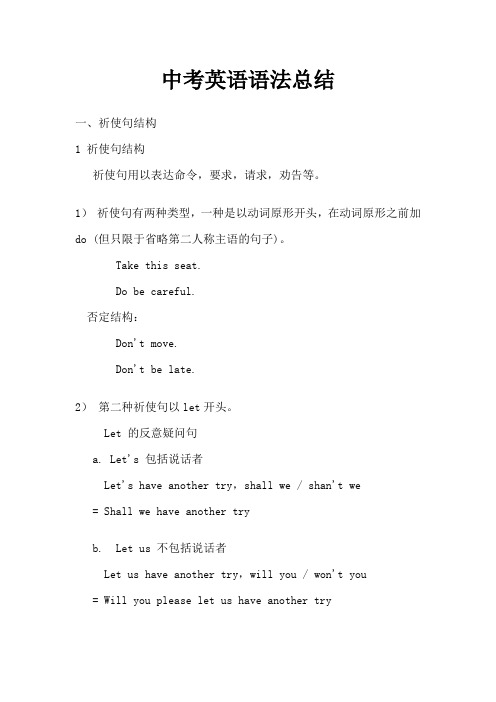
中考英语语法总结一、祈使句结构1 祈使句结构祈使句用以表达命令,要求,请求,劝告等。
1)祈使句有两种类型,一种是以动词原形开头,在动词原形之前加do (但只限于省略第二人称主语的句子)。
Take this seat.Do be careful.否定结构:Don't move.Don't be late.2)第二种祈使句以let开头。
Let 的反意疑问句a. Let's 包括说话者Let's have another try,shall we / shan't we= Shall we have another tryb. Let us 不包括说话者Let us have another try,will you / won't you= Will you please let us have another try否定结构:Let's not talk of that matter.Let us not talk of that matter.二、感叹句结构感叹句结构感叹句通常有what, how引导,表示赞美、惊叹、喜悦、等感情。
what修饰名词,how 修饰形容词,副词或动词,感叹句结构主要有以下几种:掌握它的搭配,即掌握了感叹句的重点。
How +形容词+ a +名词+ 陈述语序How+形容词或副词+ 陈述语序What +名词+ 陈述语序What+a+形容词+名词+ 陈述语序What+ 形容词+复数名词+ 陈述语序What+ 形容词+不可数名词+ 陈述语序How clever a boy he is!How lovely the baby is!What noise they are making!What a clever boy he is!What wonderful ideas (we have)!What cold weather it is!感叹句的省略形式为:What a clever boy (he is)!典型例题1)___ food you've cooked!A. How a niceB. What a niceC. How niceD. What nice 答案D. 由于How 修饰形容词,副词;what修饰名词。
中考英语语法知识归纳总结人教版

中考英语语法知识归纳总结人教版中考英语语法知识归纳总结(人教版)1. 一般现在时(Simple Present Tense)一般现在时用于描述经常性或总是发生的动作或情况。
主语为第三人称单数时,动词要加s或es。
2. 一般过去时(Simple Past Tense)一般过去时用于过去发生的动作或状态。
动词的过去式通常是加ed,但也存在一些不规则动词。
3. 现在进行时(Present Continuous Tense)现在进行时用于描述现在正在进行的动作,动词后要加ing。
4. 一般将来时(Simple Future Tense)一般将来时用于表示将来发生的动作,通常在动词前加will或be going to。
5. 情态动词(Modal Verbs)情态动词是一类特殊的动词,用于表示能力、可能性、许可、义务、建议等。
常见的情态动词有can、could、may、might、shall、should、will、would、must等。
6. 被动语态(Passive Voice)被动语态是指不直接说明动作的主体,而是将动作所受的影响或动作的承受者放在句子的主语位置。
主动句的主语变为被动句的宾语,谓语动词由“be+过去分词”构成。
7. 状语从句(Adverbial Clauses)状语从句用于修饰句子中的动词、形容词或副词,常见的包括时间状语从句、地点状语从句、条件状语从句、原因状语从句、结果状语从句等。
8. 定语从句(Adjective Clauses)定语从句用于修饰名词或代词,来限定或说明其意义。
引导定语从句的关联词有who、which、that、whose等。
9. 名词性从句(Noun Clauses)名词性从句用作句子的主语、宾语、表语等成分。
常见的名词性从句有主语从句、宾语从句、表语从句和同位语从句等。
10. 直接引语和间接引语(Direct and Indirect Speech)直接引语是直接引述别人的话,需用引号括起来;间接引语是将别人的话间接转述,需进行相应的句法和时态变化。
最新人教版九年级英语中考复习提纲(精华整理版)

精品文档Unit 1 How do you study for a teat?一、重点词汇:1. different f differenee f differSn toud f loudly= aloud 3. learn Tearner4. frustrate f frustrated f frustf a trng f un fair 6.Less f uni ess 7.low f slowly6.1m porta nt f uni mportar7. quick f quickly8.Easy f easily9. develop f development f developing f developed二、重点短语:I. not at all根本不,全然不2. end up 结束,告终3. make mistakes犯错,出错4. to beg in with = to start with=first of all 启动,开始5. later on 以后,随后6. make up组成,构成look up查阅查找7. deal with处理,料理8. go by (指时间)过去,消逝9. take n otes做笔记10. break off突然中止,中断II. laugh at 嘲笑12. be an gry with 生某人的气13.be afraid to do sth 害怕去做某事14.break off 突然终止中断15.face to face 面对面16.try one best 尽力做三、语法:1. by + V + ing 做状语表方式2. V f V + ing 动名词在句首做主语、谓语动词用单数形式3. 特殊疑问句(how / what •)• + to do4. decide to do介词后动词加ing6. too …to夫 ... 以至不能7. practise doing sth.8. have trouble doing 做某事有困难=have problem(s) doing=have difficulty doingUnit 2 I used to be afraid of the dark一、重点词汇:1、terrify f errified2、day f daily3、decide f decision4、die f dead f death、sleep f asleep f sleepy、interest f interesting f interested7、surprise f surprised 8、chat f chatting二、重点短语:1. used to过去常常做某事be/get used to doing sth习惯于,to为介词.2. wear表示状态.=be in +颜色的词;put on表示动作.dress + 人给某人穿衣服dress sb. / on eself get dressed,穿好衣服3. be terrified of doing sth =be afraid of 害怕...4.be in terested in 对.. 感兴趣5. make a decisi on 下决心6.no longer ----- n ot ........ a ny more不再7. pay attention to 留心、8.give up 放弃give up doing9. take pride in ---- be proud of 对 ... 感到自豪10.to one ' s surp令某人惊奇的人11.chat with 与... 聊天12.in the end --- a t last 最后13. alo ne = by on eself独自一人.Ion ely孤独的,寂寞的三、语法:1、反意疑问句:结构:陈述句+简单的一般疑问句注意:前肯后否,前否后肯祈使句的反臆疑问句用will you ? 用Let '开头的用shall we?2. spe nd (in) doing sth paytakecostUnit 3 Teen agers should be allowed to choose their own clothes一、重点词汇:1、important f importanee2、succeed f success f successful f successfully3、achieve f achievement二、 重点词组:1、 be allowed to do sth 被允许去做某事2、 driver ' s licen 驾驶执照3、part-time job 兼职工作4、in the way 妨碍5、learn from 向 ... 学习6、stay up 熬夜,不睡觉7、old people ' s ho 养老院8 be strict with 对 .... (某人)要求严格 be strict in 对 ..... (某事)要求严格10、 be good for 对 .. 有益 be good at 在 ...... 方面学得好 be good with11、 at least 至少 12、in stead of 代替 13、con ce ntrate on 全神贯注14、at present = now 现在、目前 15、care about 关心,担心,在乎16、 have an opport unity to do sth 有做…的机会17、 achieve one ' s dsea 实现梦想 18、good opport unity 好机会三、 重点句型:1、Sixtee n-year-olds should be allowed to drive.2、They talk in stead of doing homework3、 we would concentrate more on our clothes than our studies.4、I want to be a doctor when I ' m 5lder. m serious about nd n g.四、语法:1、 舍有情态动词的被动语态: 情态动词+be+动词的过去分词2、 倒装句:So + be 动词/助动词/情态动词+主语 表示与前面所述事实一致.So +主语+ be 动词/助动词/情态动词 表示对前面事实的进一步确认3、 sixteen — year — olds 名词短语Unit 4 what would you do?一、重点词汇:1、 con fide nt f con fide nee2、 permit f permissi on4、 know f well -k now5、 final f fin ally7、listen f listener 8、energe f energetic10、medici ne f medical 11、hon est f dish on est 13、dan ger f dan gerous二、重点短语:1. get along with=get on with 和某人相处get well along with =get on well with 和某人相处得好2. not …in the slightest = not at all3.let down 使 .... 失望=make sb frustrated4. come up with 提出 、想出 =think of = think up5. come out 出版6. running water 自来水 hot water 7 medical research 医学研究8.internet friends 网友 9. what if 如果 ....... 将会怎么样 10.bother=trouble 麻烦11. All over the world =aro und the world 全世界 12.At once =right away 立刻马上13. top stude nt 尖子生四、重要语法:1•虚拟语气(与现在事实相反的)2. prefer to do …rather than + do …would rather do …than do (= would…rather thar ) 宁愿,而不愿。
人教版初中英语九年级全册-中考英语一轮复习语法知识点

初三全册语法知识点
Grade 9
Unit 1 How can we become good learners?
Verb +bywith gerund动词+by doing sth.动名词,通过…
◉短语动词
不及物动词+副词(其后不加宾语)
breakout爆发come up(计划、建议被)提出fall behind落后
3.一般将来时的被动语态:由“shall/will/be going to/be to be+过去分词”构成。shall用于第一人称,will用于各种人称
6.某些习惯用法中(有些习惯用法常以被动形式出现,强调存在的状态)
被动语态的习惯搭配
be determined to do决心做
be interested in对……感兴趣
be seated...坐好
be dressed in...穿着……
三、被动语态的常用句式
1.普通句式
(1)肯定句式:主语+be+过去分词+其他。
8.过去完成时的被动语态:由“had been+过去分词”构成
二.被动语态的用法
下列情况下通常使用被动语态。
1.不知道动作的执行者或虽然知道动作的执行者但没有必要说出时
2.当强调动作承受者时,常用by引出动作的发出者
3.当动作的执行者是无生命名词时
4.当动作的执行者是泛指或很模糊时
5.出于礼貌不便提及动作执行者时
be+过去分词”既可表示动作,也可表示状态,但“get+过去分词”只能表示动作。
Unit 6 When was it invented?
Passive voice (past tense)被动语态一般过去时
人教版英语中考英语词汇表(1600词汇+词组)
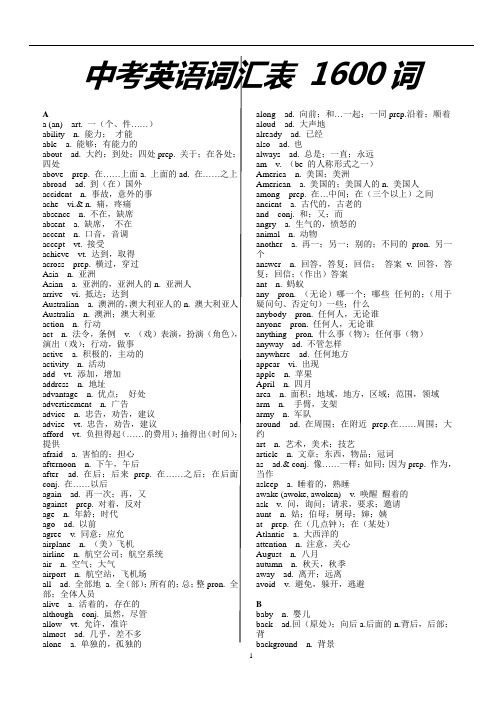
中考英语词汇表1600词Aa (an) art. 一(个、件……)ability n. 能力;才能able a. 能够;有能力的about ad. 大约;到处;四处prep. 关于;在各处;四处above prep. 在……上面a. 上面的ad. 在……之上abroad ad. 到(在)国外accident n. 事故,意外的事ache vi.& n. 痛,疼痛absence n. 不在,缺席absent a. 缺席,不在accent n. 口音,音调accept vt. 接受achieve vt. 达到,取得across prep. 横过,穿过Asia n. 亚洲Asian a. 亚洲的,亚洲人的n. 亚洲人arrive vi. 抵达;达到Australian a. 澳洲的,澳大利亚人的n. 澳大利亚人Australia n. 澳洲;澳大利亚action n. 行动act n. 法令,条例v. (戏)表演,扮演(角色),演出(戏);行动,做事active a. 积极的,主动的activity n. 活动add vt. 添加,增加address n. 地址advantage n. 优点;好处advertisement n. 广告advice n. 忠告,劝告,建议advise vt. 忠告,劝告,建议afford vt. 负担得起(……的费用);抽得出(时间);提供afraid a. 害怕的;担心afternoon n. 下午,午后after ad. 在后;后来prep. 在……之后;在后面conj. 在……以后again ad. 再一次;再,又against prep. 对着,反对age n. 年龄;时代ago ad. 以前agree v. 同意;应允airplane n. (美)飞机airline n. 航空公司;航空系统air n. 空气;大气airport n. 航空站,飞机场all ad. 全部地a. 全(部);所有的;总;整pron. 全部;全体人员alive a. 活着的,存在的although conj. 虽然,尽管allow vt. 允许,准许almost ad. 几乎,差不多alone a. 单独的,孤独的along ad. 向前;和…一起;一同prep.沿着;顺着aloud ad. 大声地already ad. 已经also ad. 也always ad. 总是;一直;永远am v. (be 的人称形式之一)America n. 美国;美洲American a. 美国的;美国人的n. 美国人among prep. 在…中间;在(三个以上)之间ancient a. 古代的,古老的and conj. 和;又;而angry a. 生气的,愤怒的animal n. 动物another a. 再一;另一;别的;不同的pron. 另一个answer n. 回答,答复;回信;答案v. 回答,答复;回信;(作出)答案ant n. 蚂蚁any pron. (无论)哪一个;哪些任何的;(用于疑问句、否定句)一些;什么anybody pron. 任何人,无论谁anyone pron. 任何人,无论谁anything pron. 什么事(物);任何事(物)anyway ad. 不管怎样anywhere ad. 任何地方appear vi. 出现apple n. 苹果April n. 四月area n. 面积;地域,地方,区域;范围,领域arm n. 手臂,支架army n. 军队around ad. 在周围;在附近prep.在……周围;大约art n. 艺术,美术;技艺article n. 文章;东西,物品;冠词as ad.& conj. 像……一样;如同;因为prep. 作为,当作asleep a. 睡着的,熟睡awake (awoke, awoken) v. 唤醒醒着的ask v. 问,询问;请求,要求;邀请aunt n. 姑;伯母;舅母;婶;姨at prep. 在(几点钟);在(某处)Atlantic a. 大西洋的attention n. 注意,关心August n. 八月autumn n. 秋天,秋季away ad. 离开;远离avoid v. 避免,躲开,逃避Bbaby n. 婴儿back ad.回(原处);向后a.后面的n.背后,后部;背background n. 背景bad (比较级worse, 最高级worst) a. 坏的;有害的,不利的;严重的bag n. 书包;提包;袋子ball n. 球balloon n. 气球bamboo n. 竹banana n. 香蕉bank1 n. (河、海、湖的)岸,堤bank2 n. 银行baseball n. 棒球basic a. 基本的basket n. 篮子basketball n. 篮球bathroom n. 浴室,盥洗室be v. 是(原形),其人称和时态形式有am, is, are, was, were, being, been;成为beach n. 海滨,海滩bear n. 熊beat (beat, beaten) v. 敲打;跳动;打赢n. (音乐)节拍beautiful a. 美的,美丽的,美观的because conj. 因为become (became, become) v. 变得;成为bed n. 床bedroom n. 寝室,卧室bee n.. 蜜蜂beef n. 牛肉before prep. 在……以前;在……前面ad. 以前conj. 在……之前beg v. 请求,乞求,乞讨begin (began, begun) v. 开始,着手behaviour n. 行为,举止behind prep. (表示位置)在…后面ad. 在后面;向后believe v. 相信,认为bell n. 钟,铃;钟(铃)声;钟形物below prep. 在……下面belt n. (皮)带beside prep. 在……旁边;靠近besides prep. 除……以外(还有)ad. 还有,此外between prep. 在(两者)之间;在……中间beyond prep. (表示位置) 在……的那边bicycle n. 自行车big a. 大的bike = bicycle n. 自行车bill n. 账单;法案,议案;(美)钞票,纸币bird n. 鸟birth n. 出生;诞生birthday n. 生日biscuit n. 饼干bit n. 一点,一些,少量的bitter a. 有苦味的;痛苦的,难过的;严酷的black n. 黑色a. 黑色的blackboard n. 黑板blind a. 瞎的blood n. 血,血液blow (blew, blown) v. 吹;刮风;吹气blue n. 蓝色a.蓝色的board n. 木板;布告牌;委员会;(政府的)部v. 上(船、火车、飞机)boat n. 小船,小舟body n. 身体book n. 书;本子boring a. 乏味的,无聊的born a. 出生borrow v. (向别人)借用;借boss n. 领班;老板both a. 两;双pron. 两者;双方bottle n. 瓶子bottom n. 底部;底bowl n. 碗box n. 盒子,箱子boy n. 男孩brain n. 脑(子)brave a. 勇敢的bread n. 面包break (broke, broken) v. 打破(断,碎);损坏,撕开breakfast n. 早餐breath n. 气息;呼吸breathe vi. 呼吸bridge n. 桥bright a. 明亮的;聪明的bring (brought, brought) vt. 拿来,带来,取来brother n. 兄;弟brown n. 褐色,棕色a. 褐色的,棕色的brush v. 刷;擦n. 刷子build (built, built) v. 建筑;造building n. 建筑物;房屋;大楼burn (-ed,-ed 或burnt, burnt) v. 燃,烧,着火;使烧焦;使晒黑bus n. 公共汽车bus stop n. 公共汽车站business n. (本分)工作,职业;职责;生意,交易;事业busy a. 忙(碌)的but conj. 但是,可是butter n. 黄油,奶油butterfly n. 蝴蝶buy(bought,bought) vt. 买by prep. 靠近,在……旁;在……时间;不迟于;被;用;由;乘(车)bye int. 再见Ccabbage n. 卷心菜,洋白菜cake n. 蛋糕,糕点;饼call n. 喊,叫;电话,通话v. 称呼;呼唤;喊,叫camel n. 骆驼camera n. 照相机;摄像机camp n. (夏令)营vi. 野营;宿营can (could) modal 可能;能够;可以can't = can not v. 不能Canada n. 加拿大cancel vt. 取消cancer n. 癌candle n. 蜡烛candy n. 糖果cap n. (无檐的或仅在前面有檐的)帽子;capital n. 首都,省会;大写;资本captain n. (海军)上校;船长,舰长;队长car n. 汽车,小卧车care n. 照料,保护;小心v. 介意…,在乎;关心careful a. 小心的,仔细的,谨慎的careless a. 粗心的,漫不经心的carry vt. 拿,搬,带,提,抬,背,抱,运等cat n. 猫catch (caught,caught) v. 接住;捉住;赶上;染上(疾病)cause n. 原因,起因vt. 促使,引起,使发生CD 光盘(compact disk的缩写)CD ROM 信息储存光盘(compact disk read-onlymemory的缩写)ceiling n. 天花板,顶棚celebrate v. 庆祝cent n. 美分(100 cents = 1 dollar)centre (美center ) n. 中心,中央century n. 世纪,百年certain a. (未指明真实名称的)某……;确定的,无疑的;一定会……chair n. 椅子chairman n. 主席,会长;议长chairwoman n. 女主席, 女会长;女议长chalk n. 粉笔chance n. 机会,可能性change v. 改变,变化;更换;兑换cheap a. 便宜的,贱cheat n. & v. 骗取,哄骗;作弊check n. 检查;批改vt. 校对,核对;检查;批改cheese n. 奶酪chemistry n. 化学chess n. 棋chest n. 箱子;盒子;胸部chicken n. 鸡;鸡肉child (复children) n. 孩子,儿童China n. 中国Chinese a. 中国的;中国人的;中国话的,汉语的n. 中国人;中国话,汉语,中文chocolate n. 巧克力choice n. 选择;抉择choose (chose, chosen) vt. 选择chopsticks n. 筷子Christmas n. 圣诞节(12月25日)church n. 教堂;教会cinema n. 电影院;电影circle n. 圆圈vt. 将……圈起来city n. 市,城市,都市clap vi. 拍手;鼓掌class n. (学校里的)班;年级;课classmate n. 同班同学classroom n. 教室clean vt. 弄干净,擦干净a. 清洁的,干净的clear a. 清晰的;明亮的;清楚的clever a. 聪明的,伶俐的climb v. 爬,爬行,攀登clock n. 钟clone n. 克隆(无性繁殖出来的有机体群)close1 a. 亲密的;近,靠近ad. 近,靠近close2 vt. 关,关闭clothes n. 衣服;各种衣物cloud n. 云;云状物;阴影cloudy a. 多云的,阴天的club n. 俱乐部;纸牌中的梅花coach n. 教练;马车;长途车coal n. 煤;煤块coast n. 海岸;海滨coat n. 外套;涂层;表皮;皮毛vt. 给……穿外套;涂上coffee n. 咖啡coin n. 硬币Coke n. 可口可乐cold a. 冷的,寒的n. 寒冷;感冒,伤风collect vt. 收集,搜集college n. 学院;专科学校colour (美color) n. 颜色vt. 给……着色,涂色come (came, come) vi. 来,来到comfortable a. 舒服的;安逸的;舒服自在的common a. 普通的,一般的;共有的communicate v. 交际;传达(感情,信息等)communication n. 交际;交往;通讯company n. 公司compare vt. 比较,对照compete vi. 比赛,竞赛competition n. 比赛,竞赛complete a. 完成的vt. 完成,结束composition n. 作文;作曲computer n. 电子计算机computer game 电子游戏concert n. 音乐会;演奏会condition n. 条件,状况conference n. (正式的)会议;讨论connect vt. 连接,把……联系起来consider vt. 考虑continue vi. 继续control vt.& n. 控制conversation n. 谈话,交谈cook n. 炊事员,厨师v. 烹调,做饭cooker n. 炊具(锅、炉灶、烤炉等)cool a. 凉的,凉爽的;酷copy n. 抄本,副本;一本(份,册……)v. 抄写;复印;(计算机用语)拷(备份盘)corner n. 角;角落;拐角correct v. 改正;纠正 a. 正确的,对的;恰当的cost n. 价格cost (cost, cost) v. 值(多少钱);花费cotton n. 棉花a. 棉花的cough n.& vi. 咳嗽could modal v.(can的过去式)可以……;(表示许可或请求)可以……,行count vt. 数,点数country n. 国家;农村,乡下countryside n. 乡下,农村couple n. 夫妇,一对courage n. 勇气;胆略course n. 过程;经过;课程cousin n. 堂(表)兄弟,堂(表)姐妹cover n. 盖子;罩v. 覆盖,遮盖;掩盖cow n. 母牛,奶牛crayon n 蜡笔;蜡笔画crazy a. 疯狂的create vt. 创造;造成cross n. 十字形的东西vt. 越过;穿过cruel a. 残忍的,残酷的;无情的cry n. 叫喊;哭声v. 喊叫;哭culture n. 文化cup n. 茶杯cut (cut, cut) v. 切,剪,削,割n . 伤口Ddad = daddy n. (口语)爸爸,爹爹daily a. 每日的;日常的ad. 每天n. 日报dance n.& vi. 跳舞danger n. 危险dangerous a. 危险的dare v.& aux.(后接不带to的不定式;主要用于疑问,否定或条件句)敢,敢于dark n. 黑暗;暗处;日暮a. 黑暗的;暗淡的;深色的date n. 日期;约会daughter n. 女儿day n. (一)天,(一)日;白天dead a. 死的;无生命的deaf a. 聋的deal v. 对付,应付,处理dear a. 亲爱的;贵的death n. 死December n. 十二月decide v. 决定;下决心decision n. 决定;决心deep a. 深ad. 深;深厚degree n. 程度;度数;学位delicious a. 美味的,可口的dentist n. 牙科医生depend vi. 依靠,依赖,指望;取决于describe vt. 描写,叙述desk n. 书桌,写字台develop v. (使)发展;(使)发达;(使)发育;开发vt. 冲洗(照片)development n. 发展,发达,发育,开发dialogue (美dialog) n. 对话diary n. 日记;日记簿dictionary n. 词典,字典die v. 死difference n. 不同different a. 不同的,有差异的difficult a. 难的;艰难的;不易相处的difficulty n. 困难,费力dig (dug, dug) v. 挖(洞、沟等);掘dinner n. 正餐,宴会direct a. 直接的;直达的;直截了当的vt.指挥;指导;监督;管理;指挥(演奏);导演(电影)direction n. 方向;方位director n. 所长,处长,主任;董事;导演dirty a. 脏的discover vt. 发现discovery n. 发现discuss vt. 讨论,议论discussion n. 讨论,辩论disease n. 病,疾病dish n. 盘,碟;盘装菜;盘形物dismiss vt. 让……离开;遣散;解散;解雇disturb vt. 扰乱;打扰divide vt. 分,划分do (did, done) v. & aux. 做,干(用以构成疑问句及否定句。
- 1、下载文档前请自行甄别文档内容的完整性,平台不提供额外的编辑、内容补充、找答案等附加服务。
- 2、"仅部分预览"的文档,不可在线预览部分如存在完整性等问题,可反馈申请退款(可完整预览的文档不适用该条件!)。
- 3、如文档侵犯您的权益,请联系客服反馈,我们会尽快为您处理(人工客服工作时间:9:00-18:30)。
马上就要中考了,祝大家中考都考上一个理想的高中!欢迎同学们下载,希望能帮助到你们!
人教版中考英语知识点大全
一、必背知识点总结:
1 (see 、hear 、notice 、find 、feel 、listen to 、 look at (感官动词)+do eg:I like watching monkeys jump
2 (比较级 and 比较级)表示越来越怎么样
3 a piece of cake =easy 小菜一碟(容易)
4 agree with sb 赞成某人
5 all kinds of 各种各样 a kind of 一样
6 all over the world = the whole world 整个世界
7 along with同……一道,伴随…… eg : I will go along with you我将和你一起去
the students planted trees along with their teachers 学生同老师们一起种树
8 As soon as 一怎么样就怎么样
9 as you can see 你是知道的
10 ask for ……求助向…要…(直接接想要的东西)
11 ask sb for sth 向某人什么
12 ask sb to do sth 询问某人某事 ask sb not to do 叫某人不要做某事
13 at the age of 在……岁时
14 at the beginning of …………的起初;……的开始
15 at the end of +地点/+时间最后;尽头;末尾
16 at this time of year 在每年的这个时候
17 be /feel confident of sth /that clause +从句感觉/对什么有信心,自信
18 be + doing 表:1 现在进行时 2 将来时
19 be able to (+ v 原) = can (+ v 原)能够……
21 be afraid to do (of sth 恐惧,害怕……
22 be allowed to do 被允许做什么
23 be angry with sb 生某人的气
24 be angry with(at) sb for doing sth 为什么而生某人的气
25 be as…原级…as 和什么一样 eg : She is as tall as me 她和我一样高
26 be ashamed to
27 be away from 远离
28 be away from 从……离开
29 be bad for 对什么有害
30 be born 出生于
31 be busy doing sth 忙于做什么事 be busy with sth 忙于……
32 be careful 当心;小心
33 be different from……和什么不一样
34 be famous for 以……著名
35 be friendly to sb 对某人友好
36 be from = come from 来自
37 be full of 装满……的 be filled with 充满 eg: the glass is full of water the glass is filled with water
38 be glad+to+do/从句
39 be going to + v(原)将来时
40 be good at(+doing) = do well in 在某方面善长, 善于……
41 be good for 对什么有好处
42 be happy to do 很高兴做某事
43 be helpful to sb 对某人有好处
44 be in good health 身体健康
45 be in trouble 处于困难中
46 be interested in 对某方面感兴趣
47 be late for = come late to 迟到 eg: Be late for class 上课迟到
48 be like 像…… eg : I'm like my mother
49 be mad at 生某人的气
50 be made from 由……制成(制成以后看不见原材料)
51 be made of 由……制成(制成以后还看得见原材料)
52 be not sure 表不确定
53 be on a visit to 参观
54 be popular with sb 受某人欢迎
55 be quiet 安静
56 be short for 表**的缩写 eg: 陶 is short for 陶俊杰
57 be sick in bed 生病在床
58 be sorry to do sth be sorry for sb eg : I am sorry for you
59 be sorry to hear that
60 be sorry to trouble sb
61 be strict in doing sth 严于做某事
62 be strict with sb 对某人要求严格
63 be strict with sb in sth 某方面对某人严格
64 be supposed to do 被要求干什么
65 be sure 表确定
66 be sure of doing sth 对做某事有信心
67 be sure of sth 对做某事有信心
68 be sure that sth 对做某事有信心
69 be sure to do sth一定会做某事We are sure to learn English well 我们一定能学好英语
70 be terrified of + 名/动doing 害怕……
71 be terrified to do sth 害怕做某事
72 be the same as …和什么一样
73 be used to doing sth 习惯做某事 My father is used to getting up early 我爸爸习惯早
74 be worth doing 值得做什么
75 be(feel) afraid to do sth 害怕做某事be afraid of sth 害怕某物 be afraid that 丛句
76 because+句子 because of +短语
eg : He was late because he had a headache He was late because of his headache
77 begin to do = start to do 开始做某事
start…with…=begin…with…以什么开始什么
78 between…and…两者之间
79 borrow sth from sb 向……借…… lend sth to sb ( lend sb sth 借给……什么东西
80 both = the same(as) = not different(from) 表相同
81 bother 打扰 bother sb to do sth
eg : I'm sorry to bother you ,but can you tell me to way to the station。
